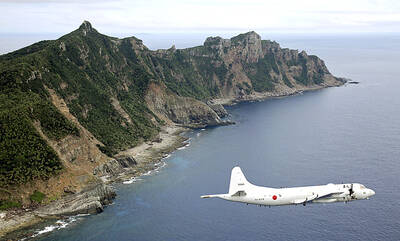The Civil Aeronautics Administration (CAA) said that China started testing its proposed M503 flight route at 11am yesterday, adding that Beijing had informed Taiwan about the test in advance, while the Ministry of National Defense (MND) and the Mainland Affairs Council (MAC) said they were closely monitoring the situation.
The test was carried out by Chinese aircraft following the route to test the accuracy of guidance given by navigational facilities, it added.
“We have information on how China planned to test the M503 flight route in the Shanghai flight information region [FIR] and have relayed the information to related agencies through existing mechanisms,” the administration said.
Separately, MND spokesperson David Lo (羅紹和) said that the military closely monitored the test, and could respond immediately in the case of an emergency.
MAC Deputy Minister Wu Mei-hung (吳美紅) said that China had Taiwan’s consent before the test.
China had said that it would start using the route on March 5.
However, Taipei said that the move was “unilateral” and “unacceptable,” because Beijing had not discussed safety issues with Taipei per customary practice among members of the International Civil Aviation Organization.
Although the new route is within the purview of the Shanghai FIR, it sparked security concerns in Taiwan as it is just 7.8km from the median line of the Taiwan Strait.
Taiwan on March 2 said that the M503 flight route would become official only after China conducted flight tests, adding that China has agreed to move the final flight path 6 nautical miles (11.1km) to the west of the original route and to use the route solely for one-way flights from north to south.
Beijing has said that the flight paths were “necessary for economic and social development, as well as flight security,” citing congestion of its A470 path as the main reason for plotting M503.
Meanwhile, Democratic Progressive Party (DPP) spokesman Cheng Yun-peng (鄭運鵬) said that even though the council said China conducted the trial flight of the M503 route with the Taiwanese government’s approval, China can always make threats and get its way.
“China was able to force Taiwan to go along with its unilateral move to open new flight routes without first negotiating them with Taiwan, which is a breach of the spirit of international civil aviation conventions,” he said.
“The DPP has lodged a formal protest against China for forcing the Taiwanese government to accept its deal,” he said.
“The DPP insists that all cross-strait agreements should be concluded bilaterally, especially where international conventions are relevant,” he added.
Also, the DPP asked the MND to expound on dangers the route could pose to national security, he said.
Additional reporting by Chen Wei-han and Loa Iok-sin

MISINFORMATION: The generated content tends to adopt China’s official stance, such as ‘Taiwan is currently governed by the Chinese central government,’ the NSB said Five China-developed artificial intelligence (AI) language models exhibit cybersecurity risks and content biases, an inspection conducted by the National Security Bureau (NSB) showed. The five AI tools are: DeepSeek, Doubao (豆包), Yiyan (文心一言), Tongyi (通義千問) and Yuanbao (騰訊元寶), the bureau said, advising people to remain vigilant to protect personal data privacy and corporate business secrets. The NSB said it, in accordance with the National Intelligence Services Act (國家情報工作法), has reviewed international cybersecurity reports and intelligence, and coordinated with the Ministry of Justice Investigation Bureau and the National Police Agency’s Criminal Investigation Bureau to conduct an inspection of China-made AI language

LIMITS: While China increases military pressure on Taiwan and expands its use of cognitive warfare, it is unwilling to target tech supply chains, the report said US and Taiwan military officials have warned that the Chinese People’s Liberation Army (PLA) could implement a blockade within “a matter of hours” and need only “minimal conversion time” prior to an attack on Taiwan, a report released on Tuesday by the US Senate’s China Economic and Security Review Commission said. “While there is no indication that China is planning an imminent attack, the United States and its allies and partners can no longer assume that a Taiwan contingency is a distant possibility for which they would have ample time to prepare,” it said. The commission made the comments in its annual

‘TROUBLEMAKER’: Most countries believe that it is China — rather than Taiwan — that is undermining regional peace and stability with its coercive tactics, the president said China should restrain itself and refrain from being a troublemaker that sabotages peace and stability in the Indo-Pacific region, President William Lai (賴清德) said yesterday. Lai made the remarks after China Coast Guard vessels sailed into disputed waters off the Senkaku Islands — known as the Diaoyutai Islands (釣魚台) in Taiwan — following a remark Japanese Prime Minister Sanae Takaichi made regarding Taiwan. Takaichi during a parliamentary session on Nov. 7 said that a “Taiwan contingency” involving a Chinese naval blockade could qualify as a “survival-threatening situation” for Japan, and trigger Tokyo’s deployment of its military for defense. Asked about the escalating tensions

DISPUTE: A Chinese official prompted a formal protest from Tokyo by saying that ‘the dirty head that sticks itself out must be cut off,’ after Takaichi’s Taiwan remarks Four armed China Coast Guard vessels yesterday morning sailed through disputed waters controlled by Japan, amid a diplomatic spat following Japanese Prime Minister Sanae Takaichi’s comments on Taiwan. The four ships sailed around the Senkaku Islands — known as the Diaoyutai Islands (釣魚台) to Taiwan, and which Taiwan and China also claim — on Saturday before entering Japanese waters yesterday and left, the Japan Coast Guard said. The China Coast Guard said in a statement that it carried out a “rights enforcement patrol” through the waters and that it was a lawful operation. As of the end of last month,